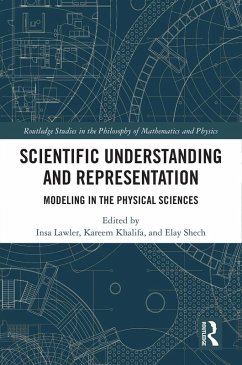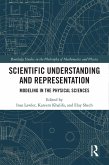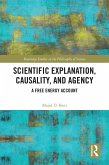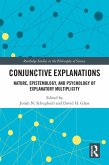Scientific Understanding and Representation (eBook, PDF)
Modeling in the Physical Sciences
Redaktion: Lawler, Insa; Shech, Elay; Khalifa, Kareem
41,95 €
41,95 €
inkl. MwSt.
Sofort per Download lieferbar

21 °P sammeln
41,95 €
Als Download kaufen

41,95 €
inkl. MwSt.
Sofort per Download lieferbar

21 °P sammeln
Jetzt verschenken
Alle Infos zum eBook verschenken
41,95 €
inkl. MwSt.
Sofort per Download lieferbar
Alle Infos zum eBook verschenken

21 °P sammeln
Scientific Understanding and Representation (eBook, PDF)
Modeling in the Physical Sciences
Redaktion: Lawler, Insa; Shech, Elay; Khalifa, Kareem
- Format: PDF
- Merkliste
- Auf die Merkliste
- Bewerten Bewerten
- Teilen
- Produkt teilen
- Produkterinnerung
- Produkterinnerung

Bitte loggen Sie sich zunächst in Ihr Kundenkonto ein oder registrieren Sie sich bei
bücher.de, um das eBook-Abo tolino select nutzen zu können.
Hier können Sie sich einloggen
Hier können Sie sich einloggen
Sie sind bereits eingeloggt. Klicken Sie auf 2. tolino select Abo, um fortzufahren.

Bitte loggen Sie sich zunächst in Ihr Kundenkonto ein oder registrieren Sie sich bei bücher.de, um das eBook-Abo tolino select nutzen zu können.
This volume brings together leading scholars working on understanding and representation in philosophy of science. It features a critical conversation format between contributors that advances debates concerning scientific understanding, scientific representation, and their delicate interplay.
- Geräte: PC
- mit Kopierschutz
- eBook Hilfe
Andere Kunden interessierten sich auch für
![Scientific Understanding and Representation (eBook, ePUB) Scientific Understanding and Representation (eBook, ePUB)]() Scientific Understanding and Representation (eBook, ePUB)41,95 €
Scientific Understanding and Representation (eBook, ePUB)41,95 €![The Routledge Handbook of Scientific Realism (eBook, PDF) The Routledge Handbook of Scientific Realism (eBook, PDF)]() The Routledge Handbook of Scientific Realism (eBook, PDF)50,95 €
The Routledge Handbook of Scientific Realism (eBook, PDF)50,95 €![The Routledge Handbook of Scientific Realism (eBook, ePUB) The Routledge Handbook of Scientific Realism (eBook, ePUB)]() The Routledge Handbook of Scientific Realism (eBook, ePUB)50,95 €
The Routledge Handbook of Scientific Realism (eBook, ePUB)50,95 €![Understanding and Conscious Experience (eBook, PDF) Understanding and Conscious Experience (eBook, PDF)]() Understanding and Conscious Experience (eBook, PDF)41,95 €
Understanding and Conscious Experience (eBook, PDF)41,95 €![The Instrument of Science (eBook, PDF) The Instrument of Science (eBook, PDF)]() Darrell P. RowbottomThe Instrument of Science (eBook, PDF)44,95 €
Darrell P. RowbottomThe Instrument of Science (eBook, PDF)44,95 €![Scientific Explanation, Causality, and Agency (eBook, PDF) Scientific Explanation, Causality, and Agency (eBook, PDF)]() Majid D. BeniScientific Explanation, Causality, and Agency (eBook, PDF)41,95 €
Majid D. BeniScientific Explanation, Causality, and Agency (eBook, PDF)41,95 €![Conjunctive Explanations (eBook, PDF) Conjunctive Explanations (eBook, PDF)]() Conjunctive Explanations (eBook, PDF)41,95 €
Conjunctive Explanations (eBook, PDF)41,95 €-
-
-
This volume brings together leading scholars working on understanding and representation in philosophy of science. It features a critical conversation format between contributors that advances debates concerning scientific understanding, scientific representation, and their delicate interplay.
Dieser Download kann aus rechtlichen Gründen nur mit Rechnungsadresse in A, B, BG, CY, CZ, D, DK, EW, E, FIN, F, GR, HR, H, IRL, I, LT, L, LR, M, NL, PL, P, R, S, SLO, SK ausgeliefert werden.
Produktdetails
- Produktdetails
- Verlag: Taylor & Francis eBooks
- Seitenzahl: 428
- Erscheinungstermin: 13. Dezember 2022
- Englisch
- ISBN-13: 9781000782035
- Artikelnr.: 66300813
- Verlag: Taylor & Francis eBooks
- Seitenzahl: 428
- Erscheinungstermin: 13. Dezember 2022
- Englisch
- ISBN-13: 9781000782035
- Artikelnr.: 66300813
- Herstellerkennzeichnung Die Herstellerinformationen sind derzeit nicht verfügbar.
Insa Lawler is Assistant Professor of Philosophy at the University of North Carolina at Greensboro, USA. Kareem Khalifa is Professor of Philosophy at Middlebury College, USA. He is the author of Understanding, Explanation, and Scientific Knowledge (2017). Elay Shech is Associate Professor of Philosophy at Auburn University, USA.
1. Introduction, Kareem Khalifa, Insa Lawler, and Elay Shech; Part I: Understanding, Knowledge, and Explanation; 2. Can Scientific Understanding be Reduced to Knowledge?, Henk W. de Regt; 3. Should Friends and Frenemies of Understanding be Friends? Discussing de Regt, Kareem Khalifa; 4. Frenemies or Friends? A Reply to Kareem Khalifa, Henk W. de Regt; 5. Onwards, My Friend! Reply to de Regt, Kareem Khalifa; 6. Factivism in Historical Perspective: Understanding the Gravitational Deflection of Light, Sorin Bangu; 7. Ideal Patterns and Non-Factive Understanding, Mazviita Chirimuuta; 8. Topological Explanations: An Opinionated Appraisal, Daniel Kostic; 9. Explanatory Power: Factive vs. Pragmatic Dimension, Juha Saatsi; Part II: Understanding and Scientific Realism; 10. Understanding the Success of Science, Christopher Pincock; 11. Truth and Reality: How to be a Scientific Realist Without Believing Scientific Theories Should be True, Angela Potochnik; 12. Defensible Scientific Realism: A Reply to Potochnik, Christopher Pincock; 13. Different Ways to be a Realist: A Response to Pincock, Angela Potochnik; 14. Realism About Molecular Structures, Amanda J. Nichols and Myron A. Penner; 15. Anti-Fundamentalist Lessons for Scientific Representation from Scientific Metaphysics, Julia R.S. Bursten; Part III: Understanding, Representation, and Inference; 16. Factivity, Pluralism and the Inferential Account of Scientific Understanding, Jaakko Kuorikoski; 17. Scientific Representation and Understanding: A Communal and Dynamical View, Collin Rice; 18. Representation and Understanding are Constitutively Communal but Not Constitutively Historical, Jaakko Kuorikoski; 19. Which Modal Information and Abilities Are Required for Inferential Understanding?, Collin Rice; 20. Maps, Models, and Representation, James Nguyen and Roman Frigg; 21. DEKI, Denotation, and the Fortuitous Misuse of Maps, Jared Millson and Mark Risjord; 22. DEKI and the Mislocation of Justification: A Response to Millson and Risjord, Roman Frigg and James Nguyen; 23. DEKI and the Justification of Surrogative Inference: A Response, Jared Millson and Mark Risjord; 24. How Values Shape the Machine Learning Opacity Problem, Emily Sullivan; 25. Understanding from Deep Learning Models in Context, Michael Tamir and Elay Shech; 26. Link Uncertainty, Implementation, and ML Opacity: Some Clarifications, Emily Sullivan; 27. Expecting Too Much from Our Machine Learning Models, Elay Shech and Michael Tamir; Part IV: Understanding and Scientific Progress; 28. Understanding the Progress of Science, C. D. McCoy; 29. Scientific Progress Without Justification, Finnur Dellsén; 30. The Significance of Justification for Progress: A Reply to Dellsén, C. D. McCoy; 31. Scientific Progress without Problems, Finnur Dellsén.
1. Introduction, Kareem Khalifa, Insa Lawler, and Elay Shech; Part I: Understanding, Knowledge, and Explanation; 2. Can Scientific Understanding be Reduced to Knowledge?, Henk W. de Regt; 3. Should Friends and Frenemies of Understanding be Friends? Discussing de Regt, Kareem Khalifa; 4. Frenemies or Friends? A Reply to Kareem Khalifa, Henk W. de Regt; 5. Onwards, My Friend! Reply to de Regt, Kareem Khalifa; 6. Factivism in Historical Perspective: Understanding the Gravitational Deflection of Light, Sorin Bangu; 7. Ideal Patterns and Non-Factive Understanding, Mazviita Chirimuuta; 8. Topological Explanations: An Opinionated Appraisal, Daniel Kostic; 9. Explanatory Power: Factive vs. Pragmatic Dimension, Juha Saatsi; Part II: Understanding and Scientific Realism; 10. Understanding the Success of Science, Christopher Pincock; 11. Truth and Reality: How to be a Scientific Realist Without Believing Scientific Theories Should be True, Angela Potochnik; 12. Defensible Scientific Realism: A Reply to Potochnik, Christopher Pincock; 13. Different Ways to be a Realist: A Response to Pincock, Angela Potochnik; 14. Realism About Molecular Structures, Amanda J. Nichols and Myron A. Penner; 15. Anti-Fundamentalist Lessons for Scientific Representation from Scientific Metaphysics, Julia R.S. Bursten; Part III: Understanding, Representation, and Inference; 16. Factivity, Pluralism and the Inferential Account of Scientific Understanding, Jaakko Kuorikoski; 17. Scientific Representation and Understanding: A Communal and Dynamical View, Collin Rice; 18. Representation and Understanding are Constitutively Communal but Not Constitutively Historical, Jaakko Kuorikoski; 19. Which Modal Information and Abilities Are Required for Inferential Understanding?, Collin Rice; 20. Maps, Models, and Representation, James Nguyen and Roman Frigg; 21. DEKI, Denotation, and the Fortuitous Misuse of Maps, Jared Millson and Mark Risjord; 22. DEKI and the Mislocation of Justification: A Response to Millson and Risjord, Roman Frigg and James Nguyen; 23. DEKI and the Justification of Surrogative Inference: A Response, Jared Millson and Mark Risjord; 24. How Values Shape the Machine Learning Opacity Problem, Emily Sullivan; 25. Understanding from Deep Learning Models in Context, Michael Tamir and Elay Shech; 26. Link Uncertainty, Implementation, and ML Opacity: Some Clarifications, Emily Sullivan; 27. Expecting Too Much from Our Machine Learning Models, Elay Shech and Michael Tamir; Part IV: Understanding and Scientific Progress; 28. Understanding the Progress of Science, C. D. McCoy; 29. Scientific Progress Without Justification, Finnur Dellsén; 30. The Significance of Justification for Progress: A Reply to Dellsén, C. D. McCoy; 31. Scientific Progress without Problems, Finnur Dellsén.







